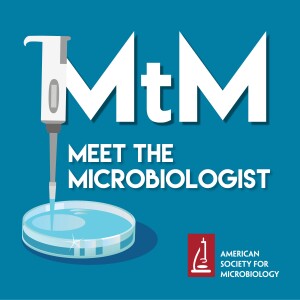
107: CRISPR, anti-CRISPR, and anti-anti-CRISPR systems with Joe Bondy-Denomy
 2019-05-02
2019-05-02
CRISPR is a genome-editing tool, but what is its role in microbial biology and evolution? Joe Bondy-Denomy discusses his discovery of the first anti-CRISPR protein and the many unanswered questions surrounding CRISPR biology.
Julie’s Biggest Takeaways
CRISPR is a bacterial immune system that identifies and destroys specific nucleotide sequences. These sequences are most commonly associated with foreign DNA from bacteriophage or plasmids.
Bacterial acquisition of new CRISPR spacer sequences is fairly inefficient, and often a bacterium dies before acquiring and fending off a new phage infection. Only about 1 in a million cells emerge from a phage infection with a new spacer sequence, likely driven defective phages that act as a vaccine of sorts to provide spacer sequence material.
40% of bacteria and 85-90% of archaea have had some sort of CRISPR system detected in their genomic sequences.
Most bacteria have Type I CRISPR system. This system includes different proteins that serve unique functions: one holds onto CRISPR RNA, one helps identify complementary sequences, and one cleaves the actual nucleotide sequence. The Type II CRISPR system has a single protein, Cas9, which performs all of these functions by itself. Because of its simplicity, this Type II CRISPR system has become widespread as a DNA manipulation tool.
What are the inputs to CRISPR? How do bacterial cells turn CRISPR genes on and off? Do CRISPR systems serve any other regulatory functions? There are still a number of questions that need to be answered to understand the biological role of CRISPR systems.
Take the MTM listener survey (~3 min.) Joe Bondy-Denomy UCSF Lab Website Rauch BJ. Inhibition of CRISPR-Cas9 with Bacteriophage Proteins. Cell 2017. Borges AL. Bacteriophage Cooperation Suppresses CRISPR-Cas3 and Cas9 Immunity. Cell 2018. Mendoza SD. A Nucleus-Like Compartment Shields Bacteriophage DNA from CRISPR-Cas and Restriction Nucleases. bioRxiv 2018. UCSF Sandler Fellows Program HOM Tidbit: Coming of Phage Celebrating the Fiftieth Anniversary of the First Phage CourseMore Episodes
 2019-08-15
2019-08-15
 2019-04-05
2019-04-05
 2019-02-21
2019-02-21
Create your
podcast in
minutes
- Full-featured podcast site
- Unlimited storage and bandwidth
- Comprehensive podcast stats
- Distribute to Apple Podcasts, Spotify, and more
- Make money with your podcast
It is Free
- Privacy Policy
- Cookie Policy
- Terms of Use
- Consent Preferences
- Copyright © 2015-2024 Podbean.com




